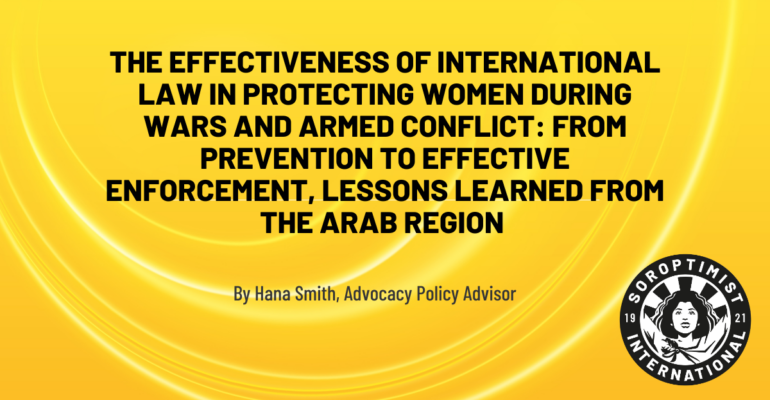Blog written by: Hana Smith, Advocacy Policy Advisor
The question of international law in times of armed conflict is a question of ever-increasing relevance in today’s fragmented world. SI’s Advocacy Policy Advisor, Hana Smith, attended a side event at CSW68 which discussed the effectiveness of international law in protecting women during wars and armed conflict – ranging from prevention to effective enforcement and lessons learned from the Arab region. Learning from our experiences and drawing on best practices is crucial to protecting all women and enhancing peace. Much remains to be done in strengthening the effectiveness of international law in times of conflict.
United Nations Security Council Resolution (UNSCR) 1325, on Women, Peace and Security (WPS) – adopted in the year 2000 – is often considered the base for global peace. Yet, with many unresolved and vicious conflicts raging around the world, it is evident that this resolution is not being effectively implemented.
Has UNSCR 1325 been successful?
According to the Secretary-General of the Jordanian National Commission for Women, H.E. Ms. Maha Ali, UNSCR 1325 was successful in promoting women’s active inclusion at the national and international level on issues of peace, security, and defence.
However, when it comes to protecting women and children in conflict the resolution falls short because there is no mechanism that can be activated to protect women and children in times of war – despite the fact that women and children are disproportionately impacted by war. The lack of a mechanism under UNSCR 1325 to hold perpetrators of war accountable is another failing of the resolution. Therefore, it is essential that this resolution be reviewed and improved, especially when it comes to the suffering of civilians, and in particular women. After all, it was issued by the UN’s Security Council exactly to stop such catastrophes from occurring.
Insights from leaders in the Arab Region
Ministers from Algeria and Morocco highlighted four key points:
- How can a woman build peace if she is violated, subjected to assault, and even killed? The root causes of gender-based violence, which are so deeply embedded in societies worldwide, must be fully dismantled to enable women a meaningful position at the table in discussions on peacebuilding and peacekeeping.
- UNSCR 1325 in its substance does carry a certain amount of weight. However, it requires the international community to enforce the resolution and its regulations. Fundamentally, political will is lacking, and that must change for the sake of all innocent civilians, including women and children.
- To achieve lasting peace, governments must invest in peace. Not only should National Action Plans under UNSCR 1325 be national priorities for governments, but funding towards National Action Plans must significantly increase to achieve sustainable results.
- Finally, perpetrators must be held accountable under every circumstance.
Multifaceted challenges faced by older persons in conflict settings
The session was rounded up by CEO of Help Age International, Mr. Cherian Mathews, who highlighted the multifaceted challenges that older people face in times of conflict. In the Arab region, women have, on average, a higher life expectancy than men.
Women living in conflicts already face a multitude of challenges, but older women are often left behind. Indeed, they suffer from the loss of a safe environment, namely through forced displacement. Yet, due to a lack of age disaggregated data it is difficult to have a full grasp on the situations older women face. Older women are often considered a burden when their families are forced to flee, meaning they lose their support mechanism and face isolation. Many older women are forced to adopt harmful practices and they rarely seek (or can access) mental health support.
Despite this web of challenges, older women have specific abilities and play important roles as caregivers, advocates, and protectors of cultural heritage. Yet they often encounter exclusion from humanitarian assistance, data collection, and decision making, which limits their access to essential services. Older people must therefore be considered under the framework of international human rights law, and a legally binding global instrument must be designed to consider older persons needs more specifically.
UNSCR 1325 and the broader WPS agenda must make more concerted efforts to include older people in conflict resolution, humanitarian response and reconstruction, to ensure that older women specifically are protected from gender-based violence and all other forms of abuse and discrimination.
What can you do?
Every country is required to have a National Action Plan to detail what it is doing on WPS, which you can find here: http://1325naps.peacewomen.org/index.php/nap-overview/. Research your government’s WPS promises and advocate to ensure they are delivered in full:
- Learn about what your country has committed to in their National Action Plan – including at home and in conflict settings around the world;
- To what extent is your government focused on WPS?;
- How much of this budget is part of your government’s development funding?
We need peace above all else in a deeply concerning time of growing global instability.

